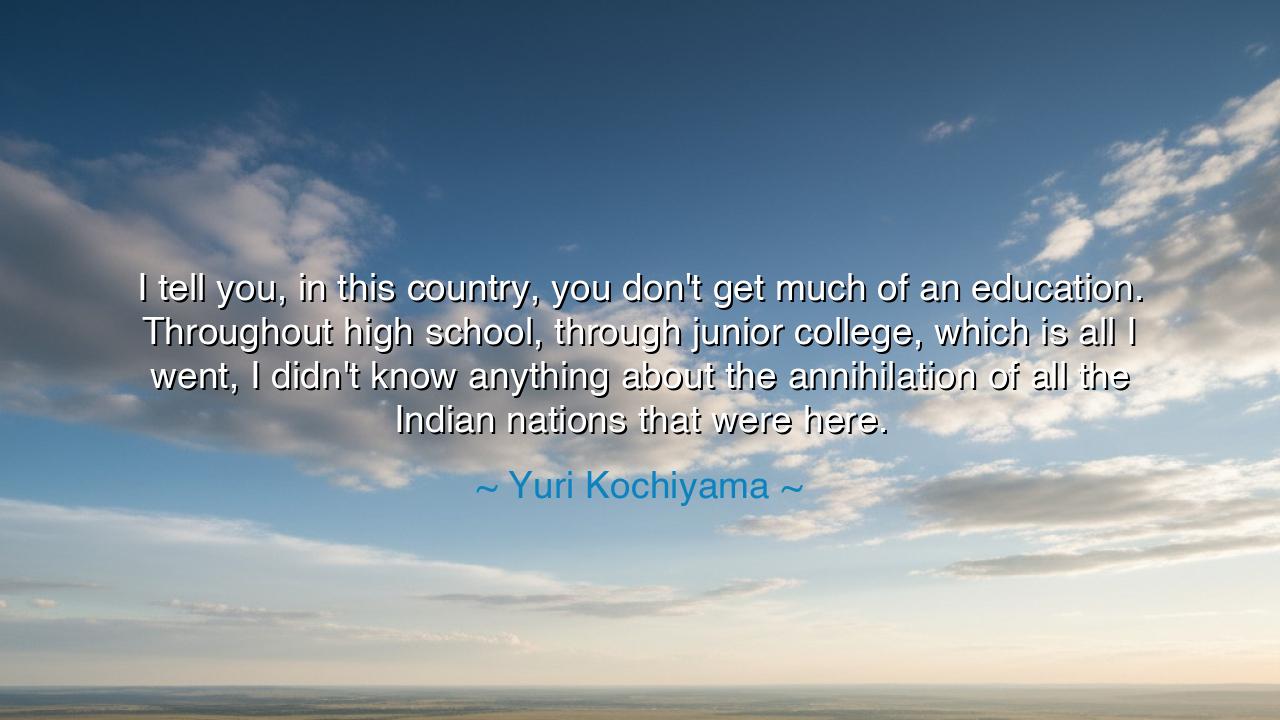
I tell you, in this country, you don't get much of an education.
I tell you, in this country, you don't get much of an education. Throughout high school, through junior college, which is all I went, I didn't know anything about the annihilation of all the Indian nations that were here.






The warrior of justice and truth, Yuri Kochiyama, once lamented: “I tell you, in this country, you don’t get much of an education. Throughout high school, through junior college, which is all I went, I didn’t know anything about the annihilation of all the Indian nations that were here.” In these words, she strikes at a wound that runs deep in the soul of a nation: the wound of forgotten history, of stories erased, of voices silenced. What she names is not the absence of books, nor the lack of schools, but the betrayal of truth—an education that hides as much as it reveals, that teaches facts while burying justice beneath silence.
For what is the worth of education if it does not tell the truth of the land upon which it stands? The student may learn of kings and presidents, of wars fought abroad, of inventions and triumphs, yet remain blind to the suffering upon which those triumphs were built. Yuri speaks not only of her own journey, but of countless generations who grew up unaware of the rivers of blood shed by the Indian nations, of the forced marches, of the broken treaties, of the very soil watered by tears of those who once dwelled here in freedom.
The annihilation she names is not only the physical destruction of peoples, but the second death—the erasure from memory. When children grow up never knowing, when citizens are taught only half of the story, the conquest is completed. Silence becomes a weapon, ignorance a prison. This is why Yuri cries out, for she saw how an education built on omissions breeds a people who cannot fully see themselves, nor truly honor the lives entwined with theirs.
Consider the tragic tale of the Trail of Tears, when the Cherokee and other nations were driven from their homelands, forced to march through hunger, disease, and death. Thousands perished, their songs fading on the road of exile. Yet in many classrooms, this agony was reduced to a line, a footnote, an afterthought. The descendants of those who walked that path often knew their own story only through whispered traditions, while the broader nation carried on as if nothing had been lost. This is the danger Yuri names: to live upon sacred ground yet never hear its cries.
But she herself became a witness, not only for her people but for all oppressed peoples. Having endured internment during the Second World War because of her Japanese heritage, Yuri learned what it meant to be erased, to be silenced, to be told that your suffering was unworthy of recognition. It was from this furnace that her spirit of solidarity was born. She saw the Indian nations, the Black freedom movement, the struggles of immigrants, and she declared: we are bound together, and to forget one story is to weaken the fight for all.
The lesson, O seekers of truth, is this: an education that comforts without confronting, that praises without remembering, is no true education at all. Knowledge must be whole, even when it is painful, even when it condemns the deeds of ancestors. For only in truth can there be healing, and only in remembrance can justice be born. Do not accept silence; question what you are taught; search for the voices hidden beneath the official lines of history.
In your daily life, practice this by seeking out the testimonies of those ignored by textbooks. Read the writings of Native scholars, listen to the stories of elders, visit the places where history’s echoes remain. Share what you learn, so that the next generation may grow not in blindness but in vision. When you hear only one story, ask what story is missing; when you are taught of triumph, ask whose suffering made it possible.
Thus we hear in Yuri Kochiyama’s cry not only a lament but a charge: do not settle for half-truths, do not accept ignorance as innocence. For the true power of education lies not in shaping obedient minds, but in awakening courageous hearts. And if we remember the voices of the Indian nations, if we restore their place in our memory, then perhaps we may yet walk a different path—one where justice rises from the ruins of silence, and truth becomes the ground upon which a new future is built.






AAdministratorAdministrator
Welcome, honored guests. Please leave a comment, we will respond soon